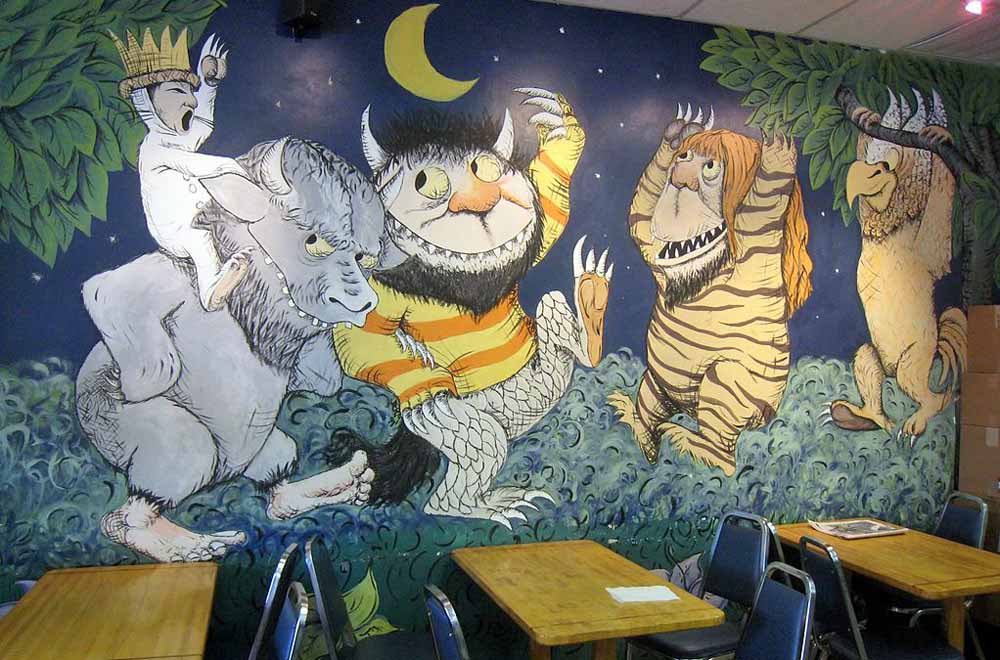
Mural of characters from "Where the Wild Things Are," at a Thundercloud Subs shop in Austin, Texas
First holy Communion is celebrated in May at our parish. We've structured our program around a parent-centered role, honoring them, as the church does, as "the first and best" teachers of the faith. So when I suggested a book they could read with their children to help them better understand the feast to which they are welcomed, I chose a book many parents know well, one which most of us have read aloud to a child: Where the Wild Things Are, by Maurice Sendak.
Sendak was neither a theologian nor a Christian, but he wrote an enduring story that begins and ends with a meal and a table, a table that remains waiting for the child even when the child abandons the table in search of more exotic pleasures. He writes of a meal that is never hidden from us, of a table that is always full, always welcoming.
The book begins on the night "Max wore his wolf suit and made mischief of one kind and another."
Sendak writes, "His mother called him "WILD THING!" and Max said, "I'LL EAT YOU UP!"
There is nothing sweet about a wolf. No child goes to bed cuddling his stuffed wolf. Wolves are always the villains ("I'LL EAT YOU UP!") and never the heroes. The wolf suit stands for all the ways we disguise and disfigure our humanity with sin. It separates us from ourselves and from others, in this case the most vital other, Max's mother. "Mischief of one kind and another" is storybook language for the real damage our disfigured humanity wreaks, upon other people and upon the created world.
Max's mother — seeking to spare anyone or anything else, like the family dog Max is seen lunging for with an upraised fork, further harm — sends him to bed without any supper. Max is out of communion.
Even Max's room, the part of the world most his own, is disfigured as a wild forest grows within it. There Max stands, alone, wearing his disguise, his back to the closed door.
A "private boat" appears and Max sails off, alone on the boat, alone on the open sea, far and ever farther from home. He comes to "where the wild things are," those creatures that "roared their terrible roars and gnashed their terrible teeth and rolled their terrible eyes and showed their terrible claws." Max is not afraid. This is a place where his wolf suit is welcome. He is one of them.
He frightens the wild things with a trick, "the magic trick of staring into all their yellow eyes without blinking once." In this faraway land Max becomes, not only "the most wild thing of all," but also "king of all wild things."
Max commands, "Let the wild rumpus start!" It is satisfying, even enchanting, for a while. But Max grows lonely and longs to be "where someone loved him best of all." It seems that being the king who must be obeyed does not bring the love he found being the little boy who must obey.
This longing for "someone who loved him best of all" in turn evokes something "from far across the world." The longing evokes a table and a meal and the fragrance of a feast. Max smells "good things to eat."
Max decides to leave, but the wild things object. They cry, "Oh, please don't go — we'll eat you up — we love you so!" I've read a lot of theology in my life, and I will put Sendak's description of the nature of sin against any theologian's. Sin "loves us so much" it will "eat us up." Sin consumes. It feeds on us. It must consume or die. Sin sets a table at which we are the main course, to be chewed up and swallowed. But within the household of God is a divine feast that welcomes and nourishes and delights. God sets a table at which we are not the dined upon but the diners. At God's table we are invited to take off our wolf suits. At God's table we are fed. At God's table we are home.
Advertisement
Max sails the route he took away from home, but in reverse, working the magic backwards all the way, until he finds himself once again "in his very own room." The vines are gone, the familiar shape of wall and window and bed is restored. The door is still closed, but this time Max faces it, the hood of his suit pushed back to reveal the face, not of a predator, but of a small boy. He is smiling, as though he knows the door will open onto goodness, onto the face of someone who loves him best of all. And there, on the table, "He found his supper waiting for him and it was still hot."
We do not know, as we prepare these children to come to the table of the Lord, how they may be led away from the table, far from home, to the "place where the wild things are." We do not know. But what we do know, and what we can promise them, is that the generous table where they have first been fed will always be waiting for them. And that the hands that provide the feast are those of someone who loves them, and will always love them, best of all.
[Melissa Musick Nussbaum's latest book, with co-author Anna Keating, is The Catholic Catalogue: A Field Guide to the Daily Acts That Make Up a Catholic Life.]
Editor's note: We can send you an email alert every time this column, My Table Is Spread, is posted. Go to this page and follow directions: Email alert signup.





